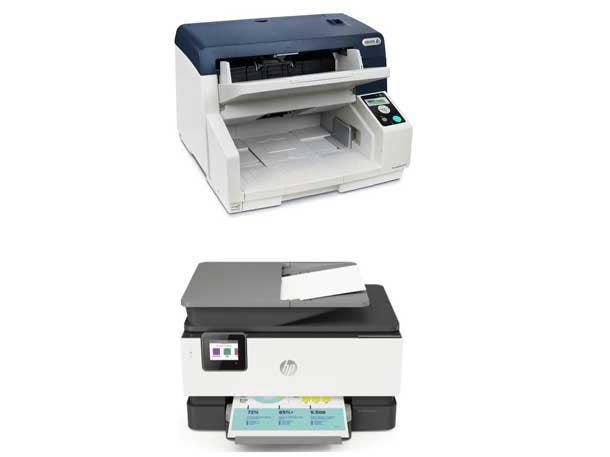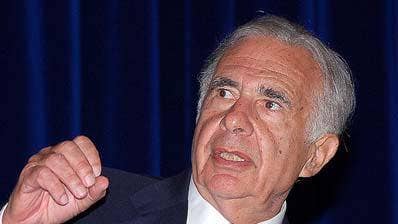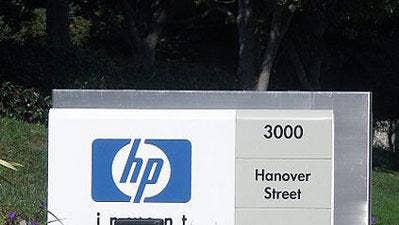HP Slams Xerox For Going 'Hostile': 5 Things To Know
The new letter from HP's board includes revelations about HP's declining interest in a merger with Xerox and HP's financial concerns about the Xerox proposal.

Prelude To A Proxy Battle?
HP Inc. and Xerox are now officially engaged in a war of words over Xerox's $33 billion HP takeover bid. Last Thursday, Xerox CEO John Visentin threatened to take the acquisition offer directly to HP shareholders. On Sunday, HP responded with its most sharply worded criticism of Xerox's approach thus far. "We will not let aggressive tactics or hostile gestures distract us from our responsibility to pursue the most value-creating path," HP's board of directors said in a letter to Visentin, which was posted online and signed by HP CEO Enrique Lores and Board Chairman Chip Bergh.
In his letter to HP's board, Visentin had given a deadline of Monday at 5 p.m., Eastern Time, to agree to mutual “confirmatory due diligence to support a friendly combination." After that, Visentin said Xerox would take the case directly to HP shareholders. HP's response thus sets the stage for a potential proxy battle between the two companies.
Along with criticism of Xerox's approach, however, the new letter from HP's board includes revelations about HP's declining interest in a merger with Xerox and HP's financial concerns about the Xerox proposal. Xerox did not respond to a request for comment.
What follows are five key things to know about HP's latest response to Xerox.

HP's Leadership Is Stepping Up Its Criticism Of Xerox
While HP's board had previously accused Xerox of making an acquisition offer that "significantly undervalues HP," the company's leadership had stopped short of strongly criticizing Xerox's tactics in previous communications. That changed with HP's Sunday letter, which slams Xerox's approach to the takeover deal in several places.
In one place, HP's board says that "it is clear in your aggressive words and actions that Xerox is intent on forcing a potential combination on opportunistic terms and without providing adequate information." The letter later says Xerox is choosing to pursue a "hostile approach" rather than a "more productive path" that could result in a merger. The board concluded its letter by citing Xerox's "aggressive tactics" and "hostile gestures" in the takeover attempt.
Notably, activist investor Carl Icahn (pictured) has sizable ownership stakes in both Xerox (10.6 percent of shares) and HP (4.24 percent). Previously, Icahn was a central figure in dissolving Xerox's planned merger with Fujifilm in 2018 and installing Visentin—a longtime loyalist of the investor—as CEO of Xerox.
HP's board added that with Xerox's exit from its joint venture with Fujifilm—in which Xerox reaped $2.3 billion earlier this month—"it appears to us that … Xerox essentially mortgaged its future for a short-term cash infusion."

HP's Interest In A Merger Is Waning
In its previous letter to Xerox, HP had sounded an optimistic tone about the possibility of merging with Xerox (under different terms than those offered by Xerox, of course). However, the latest letter from Visentin on Thursday appears to have eroded that optimism.
"When we were in private discussions with you in August and September, we repeatedly raised our questions; you failed to address them and instead walked away, choosing to pursue a hostile approach rather than continue down a more productive path," HP's board said in the letter. "But these fundamental issues have not gone away, and your now-public urgency to accelerate toward a deal, still without addressing these questions, only heightens our concern about your business and prospects."
Still, HP's board said that it remains "prepared to study the potential value of a combination and to work quickly to learn more about your business trajectory."

HP Gets More Specific About Its Financial Concerns With Xerox
HP's board had previously noted Xerox's significant decline in revenue, but added a number of additional financial metrics that are a concern in its latest letter. The board cites Xerox's projected 6 percent decline in revenue for fiscal 2019 and recent track record of missing consensus revenue estimates in four of the company's latest five quarters.
In addition, "given how much of your business is based on contractual revenue, we are concerned about the decline in customer Total Contract Value (TCV) in excess of revenue declines, which suggests your revenues may decline even faster in future years," HP's board said in the letter. "We note that the TCV of enterprise signings (including renewals) in 2018 was down 13.9 percent in constant currency and your churn for 2018 was 18 percent, both data points which Xerox has stopped providing publicly since the end of 2018."
HP's board also raised concerns about Xerox's financing for the proposed deal. Xerox leadership has said it has an assurance of financing from Citi for the deal.
"There continues to be uncertainty regarding Xerox’s ability to raise the cash portion of the proposed consideration and concerns regarding the prudence of the resulting outsized debt burden on the value of the combined company’s stock even if the financing were obtained," the board said in its Sunday letter.

HP Is Also Questioning The Synergies Promised By Xerox
A key basis for Xerox's takeover proposal is that it said significant synergies would be available by combing HP and Xerox, which are the market leaders in printers and copiers, respectively. Xerox's analysis has projected $2 billion in cost synergies within 24 months including $1.5 billion from "combining our world class R&D groups and streamlining corporate functions" and $500 million "by leveraging our scale, combined supply chain and distribution footprint," Xerox said in its initial letter proposing the deal to HP.
However, HP's board is for the first time questioning those figures in its latest letter.
"Our review of synergies based on public information and the limited information you have shared does not support achievable synergies of the scale you suggest, and it appears that your assumptions include significant savings that are already included in each company’s independently announced cost reduction plans," HP's board said in its Sunday letter.

HP 'Not Dependent' On Merger With Xerox
HP's board pointed to its own financial strength—with comparatively low debt and solid cash flows—as the solution to creating shareholder value rather than taking the deal from Xerox. The proposal would offer a 20 percent premium to HP shares above the closing price prior to the surfacing of the acquisition news.
"We believe it is important to emphasize that we are not dependent on a Xerox combination," HP's board said in the Sunday letter. "We have great confidence in our strategy and the numerous opportunities available to HP to drive sustainable long-term value, including the deployment of our strong balance sheet for increased share repurchases of our significantly undervalued stock and for value-creating M&A."
Ultimately, "the HP Board of Directors is committed to serving the best interests of HP shareholders, not Xerox and its shareholders. HP has numerous opportunities to create value for HP shareholders on a standalone basis," the board said in the letter.